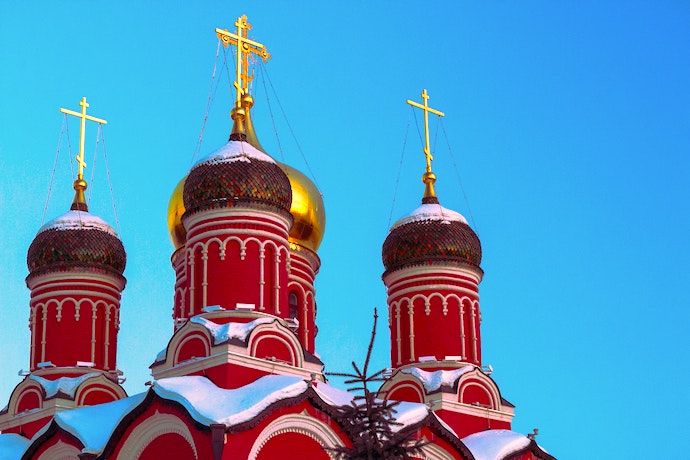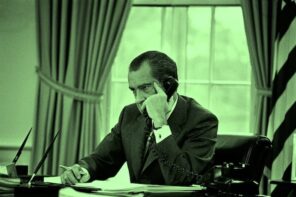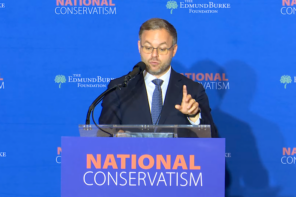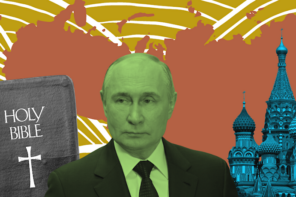Putin has now ordered Russian troops into Donetsk and Luhansk. The first major conflict between two Orthodox Christian nations since the War of the Stray Dogs in 1925 has likely just begun. That conflict (the resolution of which was incidentally perhaps the only significant accomplishment of the League of Nations) was clearly and plainly a territorial dispute. On its surface so is the current conflict in Ukraine. But appearances can be deceiving. Make no mistake about it, if there is a war between Russia and Ukraine, it will be a religious war. The sooner we in the West recognize this reality and catch up on the details, the better.
There is a very recent precedent for this. In the early part of this century, in the aftermath of 9/11, the rise of Islamic fundamentalism was—quite justifiably to be clear—given a significant amount of attention. At the same time, many rushed to assure the world that those young men who flew planes into buildings and stoned unveiled women in the street, did not represent “the real Islam.”
Far fewer made the much more accurate observation that both Osama bin Laden and Abdolkarim Soroush represented real and legitimate positions within Islam, because traditions are complicated and people with vastly differing worldviews can believably lay claim to the same historical community. For further proof of this, we need only remember that both Greg Locke (who believes witches have infiltrated his church) and leshia Evans (who peacefully stared down police at a protest of the killings of Alton Sterling and Philando Castile) are both devout Christians.
This reality sometimes leads to conflict, particularly in historical epochs characterized by significant change and instability. Western Christianity saw its tensions boil over during the Protestant Reformation and the subsequent Counter-Reformation, which not only resulted in permanent fissures within Western Christendom, but the Thirty Years’ War, which killed between 25% and 40% of the entire German population.
These conflicts also provided much of the ideological impetus for modern European colonialism, as a depleted Catholic Church went out in search of new converts (a la the Spanish conquistadors) and self-assured Calvinists (a la the Pilgrims of Plymouth) went looking for land on which to build their New Jerusalem, ensuring that lots of non-Western Europeans suffered and died as a consequence of this internal conflict.
Similarly, the tensions that motivated the terrorists in New York, Paris, and London, were largely internal to Islam; they were responding to debates over how Muslims ought to respond to Western modernity, after centuries outside, and frequently in opposition to, its powerful allure. As the uprisings of the Arab Spring suggested, the conflicts of the early 21st century weren’t a “clash of civilizations,” but a clash within a civilization, the crescendo of a 40-year conflict.
This same drama is being played out within Orthodox Christianity at this very moment. Just like Muslims, Orthodox Christians have spent the better part of the modern age in an uncomfortable dance with the West. Throughout this time, Orthodox Christians have disagreed about what their relationship should be to the liberal, secular, rationalist world. And this conflict has come to a head, breaking along old ethnic and national lines that have so long defined identity in the Orthodox world.
On one side of the conflict is the Ecumenical Patriarch of Constantinople, the culturally and linguistically Greek cleric, who has historically claimed leadership of Orthodoxy. For the better part of a century, the Patriarch of Constantinople has moved toward the West and arguably many of its values. Today’s incumbent on the Apostolic Throne of St. Andrew speaks the language of human rights, religious freedom, and trust in science. This position arises in no small part from the Patriarchate’s own precarious role as a representative of minority religion in Turkey.
At the same time, the Patriarch of Moscow, having reclaimed much of his post’s former political influence in a post-Soviet Russia, has taken to spearheading not only the traditionalist Orthodox cause, but acting as support and symbol to religious conservatives around the world.
Let the fight begin.
Ukraine has been an early and persistent hotspot in this conflict. In 2018, the Patriarch of Constantinople granted independence to the Ukrainian Orthodox Church (a status known in the Orthodox world as autocephaly). The fallout has been significant—though it isn’t obvious to most observers that the fallout is either significant or related. Most recently, on December 29, 2021, the Holy Synod of the Moscow Patriarchate, the leading body of the Russian Orthodox Church, announced its decision to establish a Patriarchal exarchate in Africa—essentially a colonial outpost—which is expected to include 102 clerics in eight countries.
So what’s the big deal?
The big deal is that all of the clerics newly under the patronage of Moscow were formerly members of the Greek Orthodox Patriarchate of Alexandria, and the Moscow Synod is explicitly tying its decision to create the new exarchate and welcome these clergy to the Patriarch of Alexandria’s decision to acknowledge the independence of the Ukrainian Orthodox Church.
Now that the conflict has moved to Africa, its political implications have become even more stark. The Orthodox Church in Africa is neither wealthy nor large. With the exception of some significant Greek communities in Egypt and South Africa (who are decidedly not in the market for a new Russian bishop), the relatively few African convert communities on the continent are neither financially affluent nor politically powerful—yet.
Modern Russia also has designs on Africa, where it seeks to compete with China and the Western powers for influence on a continent of natural resources and growing markets. And there’s little doubt that Russia has, in recent years, sought increasingly to use the Russian Orthodox Church as an instrument of foreign influence: in Ukraine, Serbia, Western Europe, and the United States. A tactic only made possible by the Patriarchate of Moscow’s desire to establish itself as the leader of the conservative Orthodox cause.
This makes the small indigenous African Orthodox community a highly valuable geo-political asset, in addition to its role as a religious one. And in turn, this new African battleground highlights why it’s high time that those outside the Orthodox world start paying much closer attention to the conflict between Moscow and Constantinople, because it’s both the source of the trouble and a proxy war. Everything one needs to understand about Russia’s current conflict with the West—politically, economically, and culturally—can be found in this pitched battle between black-robed clerics.
And while the history may be unknown and the context strange to most of those living in Europe and North America, there is a history and a context here that can no longer be ignored. Because, as we learned the hard way during the War on Terror, if we pretend that a conflict outside the West is all about the West, we run the risk of missing important nuances that leave us open to grave disappointment and loss in the years to come.





